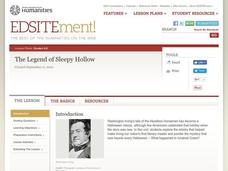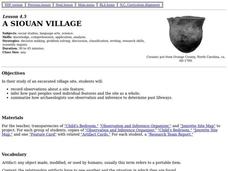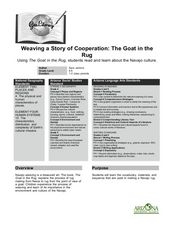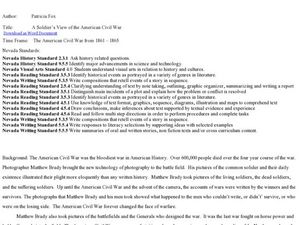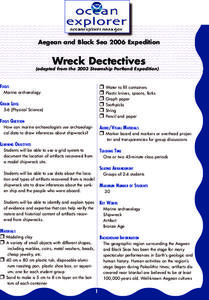Angel Island Immigration Station Foundation
How Do Pictures Tell the Story of Angel Island?
Young historians learn more about the history of Angel Island Immigration Station through their analysis of primary source images. Guided by a list of inferential questions, scholars learn how to make and record observations on a...
Curated OER
The Legend of Sleepy Hollow
Explore Washington Irving's "The Legend of Sleepy Hollow" in this literature analysis lesson. Middle schoolers read and summarize the plot of the story. They then adapt passages for a contemporary audience and analyze the...
Curated OER
A Siouan Village
Fourth graders examine the artifacts obtained from an excavated Siouan village site. They make inferences about the people who once lived there based on the artifacts and complete a Research Team Report.
Curated OER
The Diary of Anne Frank
Eighth graders read the Diary of Anne Frank. In this novel reading instructional activity, 8th graders read and analyze the story. Students do online activities and create a newspaper giving a summary of three major events in the story....
Curated OER
Weaving a Story of Cooperation: The Goat in the Rug
Weaving is an important part of Navajo culture. Read The Goat in the Rug to your fourth and fifth graders, and give them a glimpse into the process of rug making from the point of view of a goat! They will learn new vocabulary words and...
Curated OER
Many Passages: The Voyage of the Slave Ship Brookes
Examine three perspectives of the slave trade - captain, sailor, and captive - through this collaborative analysis activity. Small groups study one perspective with a primary source to analyze. They discern what is a historical fact and...
Canadian Museum of Civilization Corporation
Artifacts Tell Stories: Creating a First World War Museum in the Classroom
Although designed for the Canadian War Museum, the concept here is a solid one. Class members select an artifact from the First World War, examine it, research it, and craft an explanative label that they attach to their picture and post...
Curated OER
African Folktales Lesson
Students explore what a folktale consists of as it relates to oral tradition. In this folktale lesson, students are told the African folktale, Why the Sun is Lives in the Sky and make personal inferences about what the folktale is...
Curated OER
Immigration: Marijana's Story
Second graders explore world geography by researching U.S. history. In this immigration lesson, 2nd graders read the book Marijana's Story and discuss the main character, her goals, and the plot. Students complete a worksheet about U.S....
Curated OER
Memories to Last: Observing Monuments
Students use scientific observation and inference to examine the Hazen Brigade Monument. In this observation lesson, students review the reasons for building monuments in society. Students then recall monuments they have seen and...
Curated OER
COMING TO AMERICA:A PILGRIM STORY LESSON
By completing this lesson, students demonstrate their reading comprehension skills, including reading strategies, inference, literal meaning, and critical analysis.
Curated OER
A Soldier's View of the American Civil War
Study and research the American Civil War in this explanatory writing lesson. Middle schoolers complete six activities to learn about the American Civil War and soldiers' views of the war. The lesson includes several options to complete...
Read Works
How to Say “I Ruff You”
Who says you need a human to be your valentine on Valentine's Day? Give your dog-loving readers an inspiring perspective on how a sister givdes her brother a valentine from the family dog. They then answer 10 questions thatd involve...
Curated OER
Rudyard Kipling's "Rikki-Tikki-Tavi": Mixing Fact and Fiction
"Rikki-Tikki-Tavi," from The Jungle Book, offers young readers a chance to examine how Rudyard Kipling uses setting and personification to bring to life the brave mongoose who battles cobras to protect his family. Class members...
Curated OER
Indians of the Pacific Northwest
Students organize acquired information and make inferences as to the kind of habitat and its probable location. They identify and replicate art forms characteristic of the Pacific Northwest coast involving the use of ovoids and "u forms".
Curated OER
Wreck Detectives
Junior archaeologists examine types of artifacts from the Bronze Age on the internet. In collaborative groups, they create a story about a ship from this period and then construct a model of the ocean floor after their ship has sunk....
Curated OER
Magic Tree House #13: Reading Questions
Reading comprehension questions for the 13th Magic Tree House book, Vacation Under the Volcano, are divided by chapter. Each chapter warrants three to five questions. They cover basic comprehension, vocabulary, and some inference.
Curated OER
Archeology: Weapons of the Texanos
Pupils develop archaeological context skills through a simulation which places them in the year 2500. After listening to the teacher read, "Weapons of the Texanos," they record what they think the weapon is. Next, in groups, they pretend...
Curated OER
Piecing Together the Story of Glenn Cunningham: A Kansas Champion
Students use primary and secondary sources to conduct research about Glenn Cunningham. In this Glenn Cunningham lesson plan, students tell why he was a hero, and tell facts from what they learned.
Curated OER
Money Circulation: A Story of Trade and Commerce
Students are introduced to the meaning, symbolism, and value of the quarter. They determine the percentage of total monetary value held in quarters and graph the results. Students infer about the U.S. Mint's distrubution of coins. They...
Curated OER
The Story of How Deerfield Came to Be
Eleventh graders explore how the native peoples had lived in the Connecticut Valley for nearly 10,000 years, prior to the English settlement and how their culture and life ways were markedly different from that of the English settlers.
Curated OER
The Battle of Stones River: The Soldiers' Story
Learners organize items in a "doohickey kit" distributed by the teachers, creating categories using classification schemes. In this classification lesson, learners compare systems within groups and write questions that could be answered...
Curated OER
Transparent Shoebox Dig
Take this simulated archaeological dig one layer at a time with your young pupils to encourage observation, critical thinking, and careful attention. Using a transparent box full of layers of sand and artifacts, pupils examine the...
Curated OER
The Study of the Spanish-Speaking People of Texas: Understanding Primary Sources
Pupils analyze Russell Lee's photo essay as a sign of segregation in Texas. They consider the differences between primary and secondary sources and how historians use these sources.

